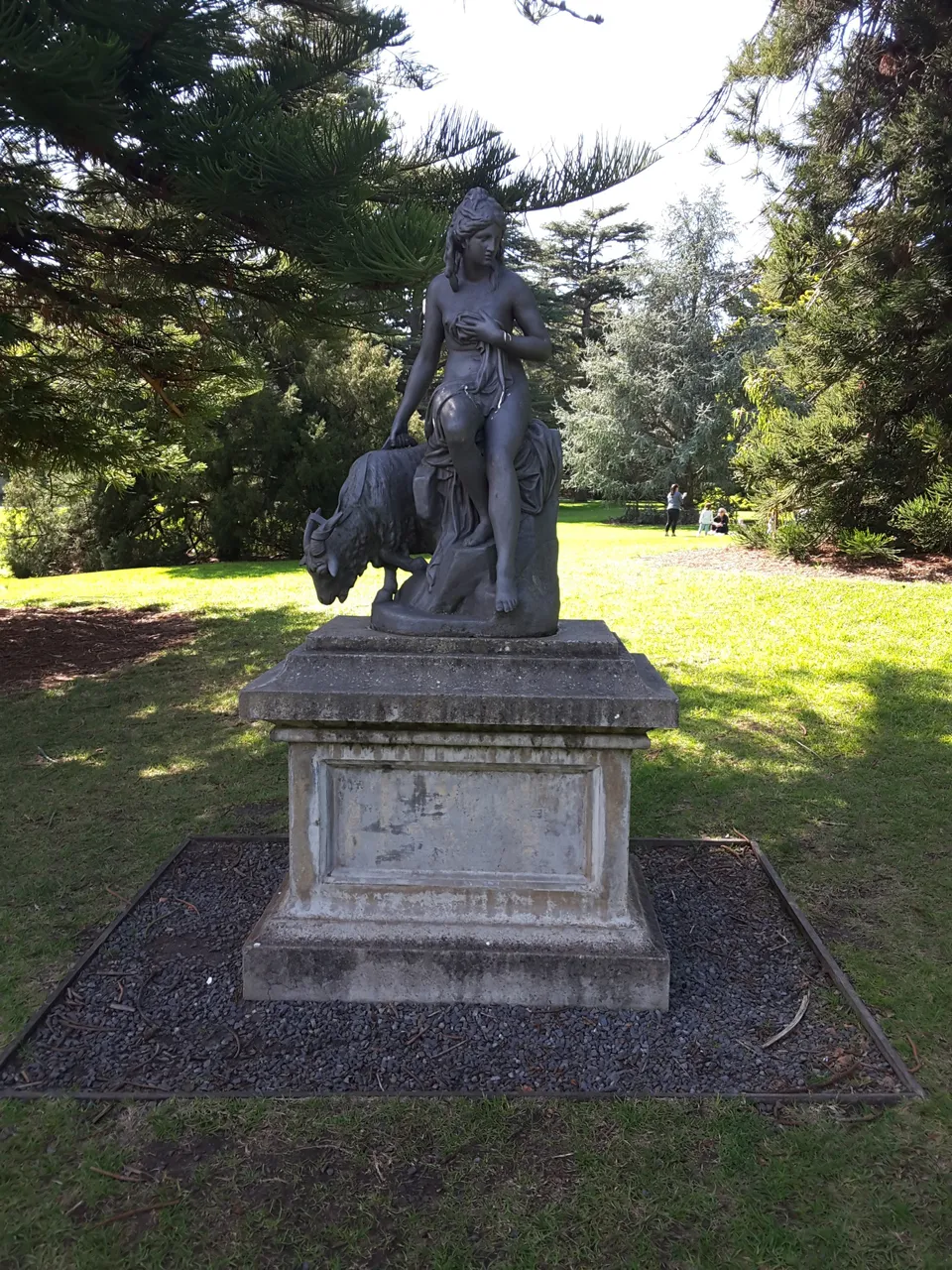History. Is it another case of it repeating itself or do we learn from it? Can we ever even really know the truth of history?
I love physical history and I love the stories of the beliefs of people through the ages. However, there's another saying and that's “the victors make the history.” So how much of what we believe to be historical truths is actually real?
The reason I like physical history, or artefacts, so much is because there is no ambiguity or belief needed for their existence, they just are. Okay, there may be some ambiguity about their age, because unless we were there at their creation, we can't be absolutely certain about when they were first made. Yet there is still something humbling about realising that people long gone saw, touched, used or lived in these old creations; that people long ago crafted these things.

Old iron statue at the Adelaide Botanic Gardens
Sometimes stories are handed down through generations about buildings, places or objects which help us to make something of a connection. We can't be sure of their truth, but our default is to believe, unless we receive other information which better fits the evidence. However, what is handed down as the truth through history, probably has a lot to do with the circumstances of the time and how it's told.
Today we can record things as proof to preserve the story of events. Some old buildings have been photographed and painted by artists over the years and this gives us evidence of what they looked like before alterations or damage and we recognise the unaltered sections, so they corroborate the stories. Previous to this, people kept history passed down only as stories or even dances and plays, acted out. We usually call these stories myths, but there's no smoke without fire and it turns out there may be more truths in those stories told than we first thought.
Recently technology has been doing measurements and analyses on the great barrier reef and they've discovered that around 10,000 years ago, the shelf where it currently sits would have been a cliff above the water. As the ice melted, the sea would have risen and flooded in to the point where the coastline sits today. You might think that this would have happened slowly, over hundreds of years, but it seems it was actually a rapid event. It happened so quickly, in fact, that the a local aboriginal tribe acts and sings a dreamtime tale of the time it occurred. It may be told as an unbelievable sounding event where a fisherman upsets a stingray so huge it flaps its wings and floods the land, sending the people retreating the cliffs, where they manage to fight it back. Yet the very tale, told in this way, has been passed down thousands of generations, to recently be corroborated by modern technology.
So are the old stories myths, or just ways that people found to explain things with the level of understanding they had? Or even ways they developed to make events interesting enough that people could remember them and pass them down?
Times are often troubled and when events occur due to disagreement between people, the evidence of others and their beliefs might be erased by the ones who survive them or win. It’s not always successful, however, because sometimes evidence remains and these are the stories I often find extra fascinating. It's a quirk of human nature that we are often more interested in the things that people try to hide from us.
Akhenaten, Nefertiti and his children Tutankhamun and Ankhesenamun, are the probably the ancient Egyptians I know the most about, despite the fact that attempts were made to wipe any trace of Akhenaten from existence. His crime was changing from worshipping Amun to worshipping Aten. Upon his death, his statues were broken, hieroglyphs pictures about him were chiselled from walls and there's a theory that his successors, Tutankhaten and Ankhesenpaaten, were made to change their names to honour Amun again.
Even recent history can't always be relied upon as the truth. A few years ago I was pretty excited to receive a copy of the complete lineage of my German grandmother. Then I got the story of why it existed. When Hitler cane to power, the German people were ordered to trace their ancestry as proof of their German heritage. My grandmother's proudly goes back to around 1600 where it disappeared with a woman who came from Switzerland; but how accurate is it really? How many German families falsified all or some of their ancestry, because to find Jewish heritage at that point could mean the concentration camps and/or death?
I will likely never know if my family did falsify any off their ancestry, but @artemislives recently shared a confession from her mother with a harrowing story of her family's life during the war, which illustrates very well how circumstances can change the narrative of history.
For some reason, many people struggle with acknowledging that our first beliefs about history and what we were taught about history, may not be entirely accurate. When new suggestions come along for alternative interpretation or even new evidence which changes the narrative, it is often shot down before it is properly looked into. I've often wondered why we are so resistant to changing our views on history, after all, it is in the past and surely shouldn't reflect on us today. Perhaps it's because of the guilt we seem to take on as our own from our ancestors, or even guilt that is pushed on us by others, due to our people's past mistakes. Or perhaps when we think we've learnt everything there is to know, we don't like being told part of it is wrong. It feels like we're being told we personally got it wrong.
What does history mean for you?